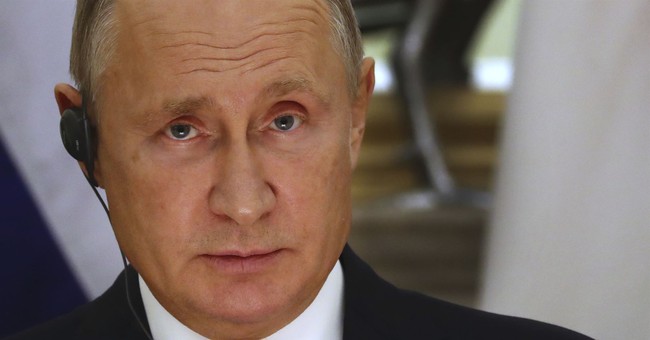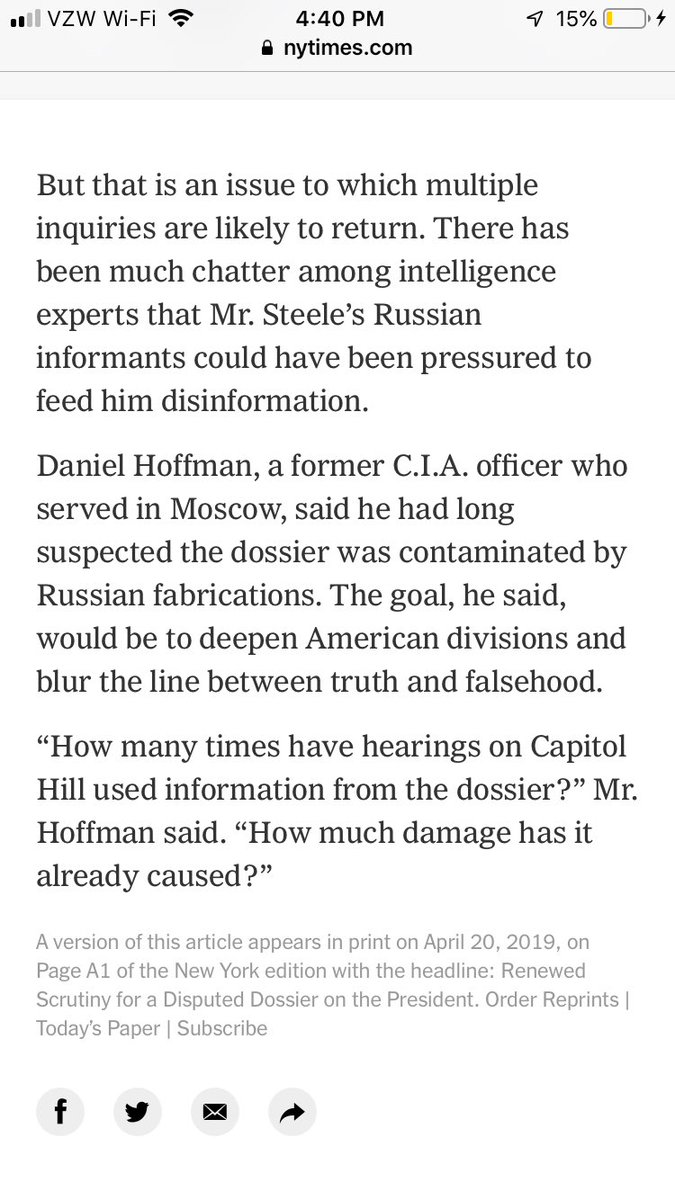NYT: Steele Dossier May Have Contained Anti-Trump Disinformation Fed to Democrats By...The Russians

Source: AP Photo/Manish Swarup
On Thursday, we highlighted a Politico story in which sources suggested that the Department of Justice's Inspector General is preparing a report that will call into serious question the reliability of the so-called 'Steele Dossier' -- an anti-Trump, Democrat-funded opposition research document that played a significant role in the launch and continuation of the counter-intelligence probe that Robert Mueller eventually inherited and concluded. Recall that the dossier (a) was bought and paid for by the Clinton campaign and the Democratic National Committee, (b) was assembled by a foreign ex-spy with whom the FBI ultimately cut ties after it became undeniable that he was lying to them about media leaks, and (c) was an indispensable and central element of the Obama-era DOJ's applications for warrants seeking to spy on individuals tied to the Trump campaign.
Over the weekend, the New York Times published a piece that effectively confirmed what many the president's defenders have been arguing for quite some time -- namely, that the infamous dossier was full of false or unsupportable claims about then-candidate Trump. Now they tell us:
The 35-page dossier, spiced up with tales of prostitutes and spies, sketched out a hair-raising story more than two years ago. Russian intelligence had used bribery and blackmail to try to turn Donald J. Trump into a source and ally, it said, and the Kremlin was running some Trump campaign aides practically as agents. But the release on Thursday of the report by the special counsel, Robert S. Mueller III, underscored what had grown clearer for months — that while many Trump aides had welcomed contacts with the Russians, some of the most sensational claims in the dossier appeared to be false, and others were impossible to prove. Mr. Mueller’s report contained over a dozen passing references to the document’s claims but no overall assessment of why so much did not check out.
Now the dossier — financed by Hillary Clinton’s campaign and the Democratic National Committee, and compiled by the former British intelligence agent Christopher Steele — is likely to face new, possibly harsh scrutiny from multiple inquiries. Republicans in Congress have vowed to investigate. The Justice Department’s inspector general is considering whether the Federal Bureau of Investigation improperly relied on the dossier in applying to the secret Foreign Intelligence Surveillance Court for a warrant to eavesdrop on Carter Page, a Trump adviser. The inspector general wants to know what the F.B.I. learned about Mr. Steele’s sources and whether it disclosed any doubts about their veracity to the court.
The Times story goes on to describe the supposed 'intelligence' contained in the explosive anti-Trump file as "rumors and hearsay" relayed through a "high stakes game of telephone." It notes how many partisans on social media and various media outlets fixated on the dossier's contents "almost daily over the past two years," with many critics of the president swallowing whole the picture it painted of a man thoroughly compromised by the Russian government. But...
Mr. Mueller, after a two-year investigation involving roughly 40 F.B.I. agents and other specialists, provided no evidence to support the claim that the adviser had collected a brokerage fee for the sale of a share of the Russian oil giant Rosneft. Nor has any evidence emerged to support the dossier’s claims about D.N.C. moles, Romanian hackers, Russian pensioners — or years of Trump-Putin intelligence trading. Other dossier assertions remain neither proved nor disproved...
We also now know that another core claim of the dossier -- that Michael Cohen traveled to Prague to meet with a Russian asset -- is false. With Mueller's investigation now over, having determined that the Trump campaign did not coordinate or conspire with Moscow's 2016 election interference project, it may be time for a reckoning over whether that probe was warranted in the first place (as I wrote in this post, I see arguments on both sides of this question). Especially worrisome is the real possibility, now being openly conceded as highly plausible, that Steele's Russian sources deliberately spoon-fed him slander and disinformation:
Another possibility — one that Mr. Steele has not ruled out — could be Russian disinformation. That would mean that in addition to carrying out an effective attack on the Clinton campaign, Russian spymasters hedged their bets and placed a few land mines under Mr. Trump’s presidency as well. Oleg D. Kalugin, a former K.G.B. general who now lives outside Washington, saw that as plausible. “Russia has huge experience in spreading false information,” he said...Last year, in a deposition in a lawsuit filed against Buzzfeed, Mr. Steele emphasized that his reports consisted of unverified intelligence. Asked whether he took into account that some claims might be Russian fabrications, he replied, “Yes.”
Is it possible that the Russians planted salacious nonsense with Steele, hopeful that their invented claims would seep into public view, undermining Trump? Yes. It may even be probable at this point. Remember, while Moscow preferred Trump to Hillary, the overarching goal was to sow division and suspicion among Americans. In that sense, it's entirely conceivable that the dossier may have been the Kremlin's most effective interference operation to date -- exploiting credulous Democrats to spread baseless and damaging information against the Republican nominee, just in case he won. I'll leave you with Wall Street Journal columnist Kimberly Strassel pointing outkey controversies and curiosities that Mueller and company barely even touched upon:
Recommended
Exclusive: Van Jones Praises Trump Admin for 'Great' Work on Prison Reform
Cortney O'Brien
What stands out is just how diligently and creatively the special counsel’s legal minds worked to implicate someone in Trump World on something Russia- or obstruction-of-justice-related. And how—even with all its overweening power and aggressive tactics—it still struck out...Note as well what isn’t in the report. It makes only passing, bland references to the genesis of so many of the accusations Mr. Mueller probed: the infamous dossier produced by opposition-research firm Fusion GPS and paid for by the Hillary Clinton campaign. How do you exonerate Mr. Page without delving into the scandalous Moscow deeds of which he was falsely accused? How do you narrate an entire section on the July 2016 Trump Tower meeting without noting that Ms. Veselnitskaya was working alongside Fusion? How do you detail every aspect of the Papadopoulos accusations while avoiding any detail of the curious and suspect ways that those accusations came back to the FBI via Australia’s Alexander Downer? The report instead mostly reads as a lengthy defense of the FBI—of its shaky claims about how its investigation began, of its far-fetched theories, of its procedures, even of its leadership.
Based on the forthcoming Inspector General report, and the Attorney General's recent hints about a broader review of his department's conduct throughout this matter, we have not heard the last of these issues.






No comments:
Post a Comment
Thanks for commenting. Your comments are needed for helping to improve the discussion.